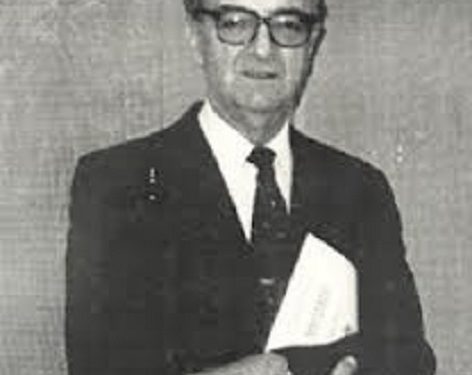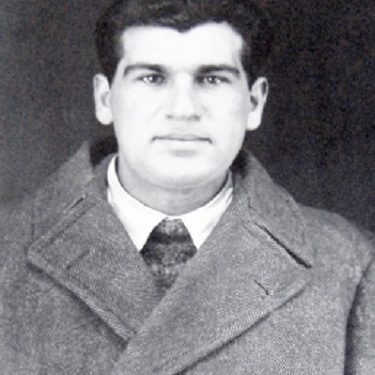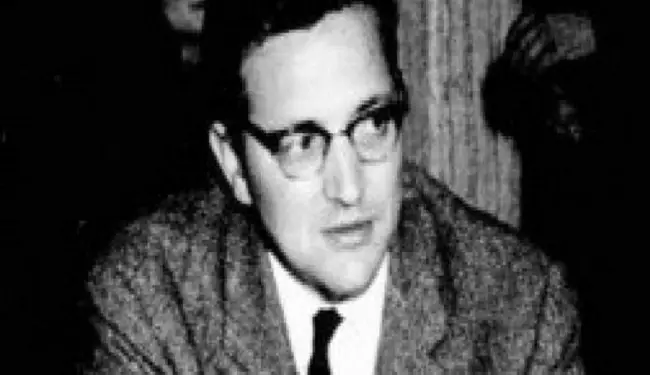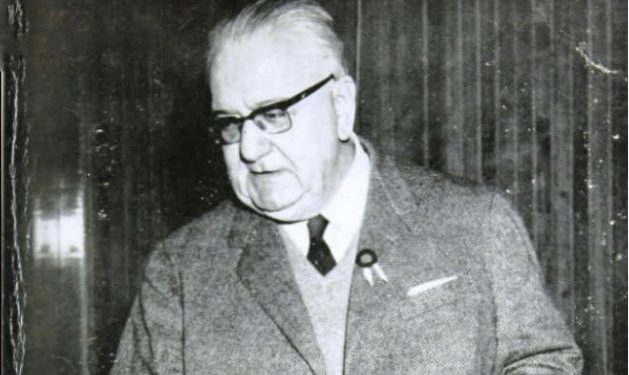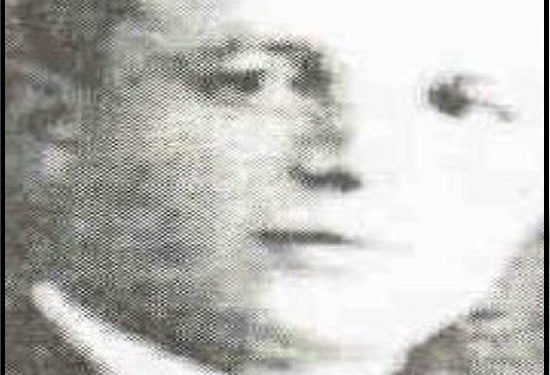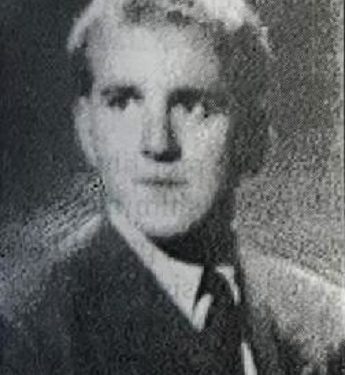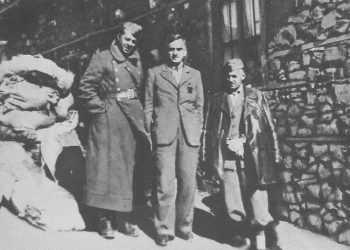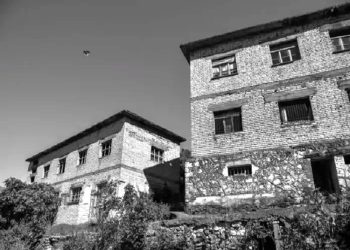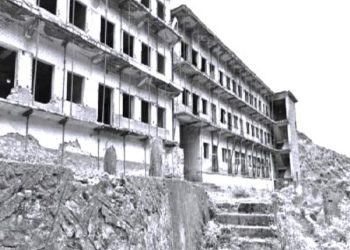Prof. Assoc. Dr. Thanas L. Gjika –
Part III
(A Portrait-Biography Dedicated to the Distinguished Activist, Professor Sami Repishti)
Memorie.al / Sami Repishti is one of those who suffered, who after enduring torture during interrogation, the suffering of prison, the risk of escape, and persistent work to qualify and serve the homeland as anti-communists, deserve to be called, even while alive, heroes of the Albanian world. Along with Arshi Pipa and Martin Camaj, he constitutes an elite trio of Shkodrans, who through their lives and work furthered the patriotic and intellectual mission of the National Renaissance and the patriots of the Second World War and its aftermath. For more than half a century, Professor Repishti, with his multifaceted work in defending the rights of Albanians wherever they live, with memoranda, political articles, analyses, essays, literary creations, speeches at conferences, interviews on Radio “Voice of America” (VOA), with his work as a co-founder of several patriotic organizations and associations, as well as with concrete actions in the homeland and in Kosovo, to closely assist the processes of democratization and the creation of a rule of law state, deserves to be called an autonomous Institution.
Continued from the previous issue
He had said several times: ‘The organization ‘Albanian Kosovar Youth in the Free World’ is the most dangerous for us, because it distributes its hostile materials before the UN and informs the whole world about the situation in Kosovo’. Although not mentioning the societies RShKBL, AACL, NAAC, etc. by name, the well-known expert on US foreign policy, former American Ambassador to Tirana, Mr. William E. Ryerson, in a letter he sent to Professor Repishti on September 6, 2001, expressed the importance of the activities of the members of these societies:
Dear Sami,
“…Undoubtedly, the credit for the liberation of Kosovo belongs to Secretary [of State] M. Albright, who had the wisdom to support what was right, as well as her ability to convince the “boss” [President Clinton] and her colleagues to act and not be limited to ineffective declarations. However, this would not have succeeded if you, and others like you, had not spent long years, especially educating the American public and, even more importantly, educating our [American] leaders about the serious problem presented by Serbian oppression against the Albanians of Kosovo…! (Newspaper “Dielli, NY December 2018, p. 33. We cited the text according to the Albanian translation made by Mr. Sami Repishti.) We emphasized the lines in bold to highlight the fact that the American politician W. Ryerson recognized the value of the long work carried out by the activist Sami Repishti, not as an individual, but together with all his colleagues, that is, with the main activists of the RShKBL, AACL, NAAC, etc. societies.
The results achieved by the RShKBL society are a consequence of the cooperation of the main members we mentioned; therefore, we suggest that the government of the Republic of Kosovo, as well as that of the Republic of Albania, should award this society, i.e., its main members (Tahir Curran Kernaja, Sami Repishti, Maliq Arifaj, Sergio and John Bitici, Peter Prifti, Rexhep Krasniqi, and Safete Juka), a gold medal for patriotic activity for the freedom of the Albanian people of Kosovo.
We seek this recognition because the achievement of success, the achievement of freedom, was not solely a result of the illegal and legal movement within Yugoslavia by heroes like Adem Demaçi, or the protesting students and pedagogues, nor solely the heroism of Adem Jashari and his clan and the KLA (UÇK). This success must be seen as a consequence of continuous activity both inside and outside Yugoslavia. And when we say outside Yugoslavia, we mean the work of the RShKBL, AACL, and NAAC societies, which through their work raised the awareness of American politicians and American policy towards this problem until coercive measures were taken against Milošević’s policy and finally the intervention of NATO armed forces.
One of the Founders of Albanian Prison Literature
The change of regime in Albania, as everywhere in Eastern Europe, brought to light the great fact that the overwhelming majority of literary and artistic works created according to the rules of the socialist realism method were works without ideological value, because they had propagated the communist ideology, which shamefully capitulated as an ideology against human nature. Most of the writers and artists indoctrinated by this ideology found it difficult, or impossible, to evolve and enter the furrow of realistic creativity. Most of them did not understand, or did not want to understand, that with their literary and artistic creations, they had harmed their people; some of them even continued to boast of their works as works that had served and continued to serve the education of the people.
In the years 1992-1993, with the departure from the political scene of the Albanian Party of Labour, the only sponsor of arts and literature, the idea was created that literature, arts, and cinematography in Albania began to experience a crisis from which they would not be able to recover. However, alongside the decline of indoctrinated creativity, realistic literary and artistic creativity began to experience a revival, a boom. Realistic literary and artistic works (stories, novels, poetry, paintings, sculptures, musical creations, and fewer cinematographic works), as well as studies liberated from politicization, were first created by former prisoners of conscience, released from prisons and internment camps, and those who had been sidelined due to a “bad biography.”
After them, some writers and artists who, before 1992, had created works of socialist realism without much desire, such as Frederik Rreshpja, Pëllumb Kulla, Naum Prifti, Zija Çela, Fatos Kongoli, etc., also began to create realistic works, the creativity of which now reached notable peaks. After 1992, the prose writers Faruk Myrtaj, Robert Martiko, Hasan Kostreci, Dashnor Kokonozi, etc. also successfully started their creative path as realist writers.
During the rule of the dictatorship of the proletariat, the fierce persecution of literary and artistic creativity that did not adhere to the norms of socialist realism led to the consequence that in Albania, we did not have any creator, writer, or artist who had drafted and published any complete dissident work in the true sense of the word. Many creators with dissident tendencies were not allowed to reach the publication of their first book, but after drafting some writings in poetry or prose, they were arrested and suffered long prison sentences, such as Kasem Trebeshina, Pjetër Arbnori, Jorgo Bllaci, Visar Zhiti, Makinsen Bungo, Maks Velo, Zydi Morava, Bashkim Shehu (who was convicted not simply because he was the son of the Prime Minister who was declared “enemy and multi-agent,” but also for the screenplay of the film “Skëterrë 43” (1980), a work with critical allusion to the dictatorship), etc. Among them were also tragic heroes who were executed by firing squad, such as Trifon Xhagjika, Genc Leka, and Vilson Blloshmi, and even worse, which were hanged like the Kuksian poet Havzi Nelaj.
Seen in its entirety, our literature published inside the country during the time of the dictatorship, as mentioned above, did not manage to have any dissident writer in the true sense of the word. Distinguished anti-communist writers who continued their creativity after escaping from Albania, such as Ernest Koliqi, Vasil Alarupi, and Isuf Luzaj, cannot be called dissident writers because their anti-communism developed in the free world away from the rule of the communist system. Similarly, those writers who flourished as anti-communist creators after escaping from Albania, such as Martin Camaj, Arshi Pipa, Sami Repishti, Bilal Xhaferi, etc., are anti-communist writers, but not dissidents. A dissident creator is one who lives under an oppressive regime and openly opposes it with literary works, journalism, party programs, etc.
Sami Repishti has written several hundred articles, over twenty books (some co-authored), and two literary works: ‘PIKA LOTI’ (written in 1959–1963 and published in 1997 and 2009) and ‘NËN HIJEN E ROZAFËS’ (Under the Shadow of Rozafa, 2004). These two works belong to Albanian realistic literature, and more specifically, they form the foundations of our literature called prison literature, which is read today with great pleasure and benefit. They reveal the life full of suffering, the endurance, and the deeds of the people condemned by the Albanian communist dictatorship, an aspect of our life that the dictatorship had distorted and kept secret.
After 1944, not all Albanian creators abandoned realistic literature. It was continued by some Albanian writers who fell into prisons and labor camps and some of those who fled to the free world. For the honor of Albanian letters, there were also brave writers like Petro Marko, Mitrush Kuteli, etc., who, despite the political consequences for their lives and those of their families, disregarded the method of socialist realism. Meanwhile, Lasgush Poradeci, Ali Asllani, etc., broke their pens after 1944. We must not fail to mention here the valuable contribution made by the young Albanian writers of Kosovo, who were formed and created in the furrow of realism in former Yugoslavia.
Our literature of the years 1944-1991, in addition to writers like Shefqet Musaraj, Aleks Çaçi, Fatmir Gjata, Llazar Siliqi, etc., who wrote only works of socialist realism, also had some writers like Sterio Spasse, Sabri Godo, Teodor Laço, etc., who drafted works that belonged to socialist realism when dealing with events from the time of socialism and purely realistic works when dealing with Albanian life from a past time. This group of writers brought both damage and value to our literature, as the case may be. Meanwhile, the literary works of Ismail Kadare and Dritëro Agolli represent a complicated literary phenomenon that requires in-depth studies to discover their values and damages.
The scarce realistic literature that developed in Albania during the years of communist dictatorship is distinguished from the literature of socialist realism by its creative method and ideological content. It applied the rules of the world’s method of realism and not the rigid rules of the method of socialist realism, which were applied only in the countries of the Socialist Camp, according to the instructions of V. I. Lenin and the theorist Andrei Zhdanov. As for the content, realistic literature was not and was not put in the service of evil; it did not elevate the policy of the state party to art, but humanism, sound morality, human love, everything that served social progress. It followed the path that Albanian and world realistic literature had taken, regardless of the literary currents and directions it might belong to.
The poetic creations of Arshi Pipa ‘Libri i Burgut’ (The Prison Book) (1959), the collection of portraits by Sami Repishti ‘Pika Loti’ (Tear Drop) (1959–1963), and the autobiographical memoir work ‘Nën hijen e Rozafës’ (2004), the poems of Visar Zhiti and Lek Pervizi (the latter as a popular rhapsodist), Uran Kostreci, Lazër Radi, etc., created in prisons and internment camps, constitute the foundations, the initiatives of prison literature. Naturally, other works are also part of these foundations that I, as an emigrant, have not been able to get hold of, as the authors or their family members publish them with sacrifices in few copies.
The volume ‘Pika Loti’ is a collection of lived stories, constructed as literary portraits, which the author wrote after escaping from the homeland in the years 1960-1963, which he did not publish in those years, but only after the change of regime, because he was afraid of causing consequences for his family members and the family members of the people he had described in them. The heroes of this work are the author’s fellow sufferers in the interrogation cells, or in the Shkodra prison and in various forced labor camps.
The volume opens with the writing dedicated to his mother and closes with the writing ‘Elegji për vëllanë’ (Elegy for the Brother), which differs from the other writings because it is not a story or a literary portrait, but a lyrical sketch, an elegy in prose. The author wrote this work in 1970, after the Albanian State Security spread the false news that the author’s brother, Vehbiu, had died. After the sketch was drafted, the author learned the truth that his brother was alive. The shock and deep despair caused to the author by the malicious news of the Security spurred the creation of this painful lyrical work.
Among the many fellow sufferers the author met during the years of his calvary in 1945–1959, he selected several prototypes, which served him to represent the fate of different layers of Albanian society under the communist dictatorship. The faithful and truthful narration of the lives and sufferings of these heroes through the reproduction of events and conversations that concretely occurred before the author’s eyes, as well as many different details, creates a very high emotionality and credibility. This emotionality and credibility could not be created at such a level if these portraits had been treated as purely literary stories.
We say this because in purely literary stories, authors, to typify their heroes, use material (events, conversations, thoughts, and descriptive details) created from their imagination and not material taken from life exactly as it happened. Typification as a literary phenomenon strengthens the artistic aspect of the work but weakens the credibility of the events and the heroes. Since credibility regarding the problems and events treated in this work is of particular importance, as it deals with concrete events and sufferers, we say that the creation of these types of stories intertwined with the features of the literary portrait has been the best path the author followed to achieve success.
The author realized the reflection of Albanian life in the years 1945–1959 as experienced by him by selecting essential events, conversations, thoughts, and different details to show the violent distortion of morality and law, the destruction and plundering that was being done to private property in the first decades after the Anti-Fascist War. This was a new path that the prose writer Repishti followed during the drafting of his portraits in the years 1960–1963.
The reproduction of the life of the persecuted in prisons or outside them exactly as it was in reality, without attempting to make generalizations and typify types and characters, has its reason in the fact that the life of these victims of the communist dictatorship was so severe and inhumane that there was no need to bring it into art by using creative fantasy to invent various details. The realistic narration of what had happened, the bringing into literature of real historical persons exactly as they had lived and suffered, was enough.
After 1992, many other convicts followed this path, or similar paths, among whom the Franciscan Father Zef Pëllumbi stood out with the volume ‘Rrno vetëm për me tregue’ (Live Only to Tell) and Visar Zhiti with a multitude of poetic and novel volumes, Hasan Kostreci with the novel ‘Jetë në diktaturë’ (Life in Dictatorship), etc. The fundamental idea of the work ‘Pika Loti’ is the revelation of the fact that communism as an ideology and practice kills the elite, mistreats the average, and elevates the inferior. The author formulated this idea, which he artistically embodied in this literary work, as a maxim in a political speech held in 1965 during the “All-American Conference” in Washington D.C., a maxim which he quotes in the introductory note of the work (p. 8).
The killing of the elite, that is, the killing of the clerical and secular intelligence and the distinguished sons of the bourgeoisie who constituted the cream of the Albanian political and economic class, created over generations and decades with effort and sacrifice, unfolds through several portraits: Qemali is the portrait centered on the distinguished Shkodran intellectual Qemal Draçini, the most distinguished high school student of Shkodra and then of all Albanian students at the University of Florence where he studied law for two years. The author adored this intellectual for his tendencies to open new horizons. This blonde and very charming young man, in his early youth, connected with the communist movement, but when he saw that the ideal for creating a new world was mixed with hatred and punishments even against family members and his own parents, he left with disgust. He could not hate and blame his own mother as the daughter of the bourgeois society.
The description of the atmosphere of 1945 becomes even more vivid when Qemali staged the drama ‘Përtej horizontit’ (Beyond the Horizon), a work by the American playwright Eugene O’Neill, at the Shkodra theater. This show, with its current resonance for the stifling condition of the Albanian intellectual youth threatened by the drought of Marxist dogmatism, shook the youth of Shkodra, as well as the organs of the new government and the State Security themselves. It caused Qemali imprisonment and unbearable inhumane tortures, from which he was able to escape by a painful suicide, swallowing a large amount of DDT powder that the prison guard threw into his cell to kill the millions of lice.
Nji shok e nji mësues: dy dëshmorë (A Friend and a Teacher: Two Martyrs), is dedicated to the two anti-fascist fighters from Vlora, Hamdi Gjoni and the teacher Bego Gjonzeneli, who were imprisoned, tortured during interrogation, and thrown into labor camps for the sole “sin” of not joining the partisan forces that were created later, but fighting as nationalists against the fascist and Nazi occupiers. The deep intelligence of the high school trade teacher from Vlora, Bego Gjonzeneli, unfolds through the reproduction of his conversations with the convicts.
The condemnation of several communist leaders by the Communist Party of Albania itself, after the breakdown of relations with J. B. Tito’s Yugoslavia in 1948, aroused some hopes among the prisoners for the softening of the dictatorship and the improvement of the situation…! However, the professor cut short their naive guesses with his reasoning: The quarrels are of an inherent nature of the communist system. We will have others, similar to this. Communists kill each other to face new situations without opposition. For absolute dictatorships, the elimination of comrades-in-arms is a fundamental principle. But this should not be understood as a signal of their end…! We have entered a framework from which it is very difficult to exit. Those who say they guide the fate of our country no longer have this fate in their hands. Another despot rules over our country today. It is the Soviet bear. / Memorie.al




